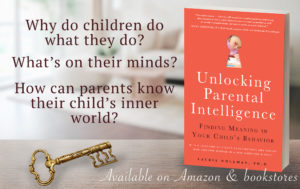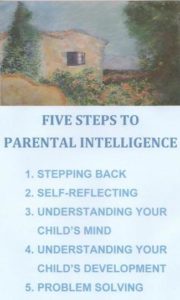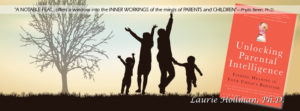Q & A with Laurie Hollman about the Parental Intelligence Way with Lisa Day from Booktime
- How long has your anxiety book been in the works?
- A book about anxiety in children began with the publishing of Unlocking Parental Intelligence: Finding Meaning in Your Child’s Behavior in 2015. The Busy Parent’s Guide to Anxiety was an offshoot of that primary book.
This first book gave a five-step approach to parenting that enabled all parents to discover what was going on in their child’s anxiety-ridden mind when they behaved in puzzling ways. The key to this book and those that followed was in the subtitle: Finding Meaning in Your Child’s Behavior.
Behavior, anxiety-derived behavior for example, is an action when a child is sending a message without words. It is a communication. Behavior is a messenger.
I was requested by the publisher and managing editor of Familius to develop the Busy Parent’s Series to telescope this parental intelligence way even further with more illustrative examples of how this approach works.
- Parental Intelligence, five steps to approach situations including stepping back, reflecting, understanding your child’s mind and development and program solving, is a solution you offer in all your books. How did you come up with this idea? Why is this approach important to parenting?
- This idea evolved quite naturally for me as a clinician and mother. I’m not exaggerating when I humbly share that my kids were not punished. We talked and talked and listened together. I delighted in their sharing of the quandaries that come with socializing, with managing various personalities of other kids and other adults such as teachers and coaches.
And now that they are parents themselves, I see them do the same with their children. It’s wonderful. This is what I want for all parents.

Read more about Parental Intelligence!
Step 1: Stepping Back allows parents to not jump to conclusions and hasty decisions. Unless there is real danger, there is time to think before we act.
Step 2: Self-Reflection is tough on parents because they begin to see how the ways they were raised, for better or worse, impacts their immediate beliefs when their children are distressed. Through self-reflection, they are much more able to make choices and decisions about how to react to their kids instead of ‘reacting’ without any sense of what has sent them into their own emotions.
Step 3: Understanding Your Child’s Mind is key to parental intelligence. How fascinating and loving it is to know what is on your child’s mind. What they think about. How they use or confuse information. What motivates their ideas and actions? When they have perhaps needless worries that new perspectives diminish.
It’s truly thrilling to catch on (without judgment) to what is flowing through your child’s mind. Then it’s rather natural, even simple to proceed with defining first and then solving what problems are perceived.
Step 4: Understanding Your Child’s Development means thinking of your child as unique because although there are volumes that list childhood milestones, kids don’t develop at the same rate or even in the same way.

Step 5: Problem Solving is the natural collaborative result of the previous steps. When a parent understands their own impulsive reactions, they can get it under control and keep their child’s development in mind. When listening to their young children and teens’ perspectives, problems start to solve themselves.
These are kids who are “critical thinkers.” They naturally learn to think something through before choosing an action or making a decision or changing that decision. These are kids with emotions that rise and fall yet are able to think as well even at the same time.
Why wouldn’t we want this for all our kids?

Did you write this book before COVID-19 hit?
- Yes, I did write before COVID-19 hit, but when emotional problems surfaced from parental and childhood fears and anxieties about the potential outcomes of this virus, parents already prepared with the parental intelligence way were able to connect more quickly with their children at an uncertain time.
But it is never too late to learn this approach.
I tried to convince my editors to let me write about the mental health of children facing COVID early in 2020, however, they did not want me to write about something that “could end before the books came out.” Now we know this was an understandable, but premature hope that such a determined illness would end rapidly.
So, unfortunately, I did not address COVID-19 in my most recent book, Playing with Baby: Research Based Approach to Bond with Your Baby Birth to One Year, but instead wrote dozens of articles on my blog try to fill that gap.
Unlocking Parental Intelligence is a book that transcends environmental crises of the day.
I strongly urge parents to read this book and ask me questions, so they can apply the approach to every day anxious moments in kids and the crises of our times.
- How has COVID-19 impacted anxiety in children. And their parents?
Your question is important. For kids taken out of the social world of the classroom and restricted to their homes with closer contact than ever with their parents on a daily basis, they were potentially deprived of face-to-face learning needed to master academics so essential to enjoying life.
Well-educated parents, especially those with parental intelligence, stepped in to ease their kids into this new transitional arena, to assist them in holding on to the value that learning is joyful and part of life without anxiety.
But not all parents are equipped to teach, to help their kids organize and concentrate on a screen for hours. And on-screen learning can feel dehumanizing when your child’s raised hand isn’t seen and your child’s questions about math aren’t heard.
Yes, of course this makes kids, teachers, and parents anxious. Their inexperience and uncertainty can readily lead them to transmit their anxieties to their kids to absorb.
- What is your advice to parents during this pandemic?My advice is straight-forward. If parents share the value of learning as a pleasurable part of life, they can support their kids transitions to new places, venues, and modes of learning by reading more to them at all ages, going on screen sites with them, nourishing them with snacks and observing them daily to look for signs and symptoms of not only old sources of anxiety that have increased, but also new signs.

Discuss the present openly and look towards the future.
- Have today’s children become more anxious? Why do you think that is? (If not, is it just talked about more?)
Hopefully, it’s talked about more. Anxiety in a general sense is quite normal when facing new challenges. It motivates and offers an incentive to develop emotional skills for coping.
Talking about anxiety, recognizing how common it is and eliminating taboos about talking about our mental life is long overdue. This crisis only highlights this.

There are multiple sources for anxiety in parents and kids. But it’s never too late to modulate and relieve it with the Parental Intelligence Way!
- What is the No. 1 way parents can help their anxious child?
Early intervention is great. If parents and kids are in tune with their bodily signals of anxiety, they will sleep better, learn better and cope better.
Please remember that different humans experience different levels of anxiety in different ways.
- You have written other books including Playing with Baby and Unlocking Parental Intelligence in addition to being a columnist and guest writer on parenting websites including Mommy Bloggers and The Huffington Post. Why do you get your ideas? What do you love about writing?
A favorite source in the past year or two is Authority Magazine and Thrive Global that frequently ask me to write lengthy articles on intriguing topics from parenting to leadership and politics. The editors are supportive and express their thanks each time. Their followers are diverse and large, so it’s satisfying to have that outlet for my conceptual thinking. - What inspires you to continue writing and sharing your expertise?The pleasure of writing itself, improving my writing skills, reaching new audiences, and continuing to learn every day. Learning is living for me. So, writing goes easily along with that.
- What are today’s parents dealing with today that parents in past may not have?
Today’s parents are enlightened by new and fascinating studies in neuroscience that are going to enable us all to understand how our brains work. The increasing wave of infant research led to my most recent book, Playing with Baby.

If we communicate with children from infancy with and without words, we will enjoy them more and they will feel secure with us.
We will have to revamp earlier thinking as new research comes out, which to me is an exciting part of living.
So, we, as parents and as adults, do feel challenged by much more extensive knowledge than before at an accelerating rate, which will continue for sure.
I encourage adults to embrace this new knowledge with open minds and hearts, and to encourage their children to do the same.

Understand our kids minds from infancy on! Such joy!
Thank you to Lisa Day at Book Time (https://booktime584.